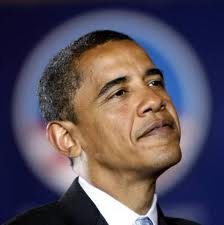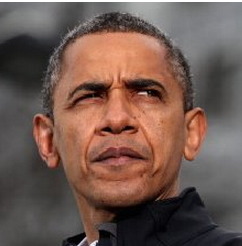The Mainstream Media Obama Psychodrama
By Thomas Lifson
AmericanThinker.com
Do not underestimate the psychological shock currently being processed by many members of the mainstream media and the low-to-medium information voters who rely on them for political analysis. To them, the election and re-election of Barack Obama, the first African American to hold the office of President of the United States, was a cause, a fulfillment of heartfelt dreams.
With
his Ivy League pedigree and ability to deliver a
speech, Obama charmed the liberal media folk into
believing that he was the one they had been waiting
for, an inspiring black man on a white horse who
could heal our
 lingering
racial wounds, if only given the chance. They hoped
he could change an America their progressive belief
system held to be flawed by racism, history, and
greedy businessmen, and by helping him do so, they
too could nudge history along in a positive
direction. Perhaps in their own minds making up for
whatever personal flaws or unfair advantages they
might have possessed along their way to the top of
the media food chain. Everyone wants to believe he
or she is a good person, doing good things in the
overall scheme of things, after all.
lingering
racial wounds, if only given the chance. They hoped
he could change an America their progressive belief
system held to be flawed by racism, history, and
greedy businessmen, and by helping him do so, they
too could nudge history along in a positive
direction. Perhaps in their own minds making up for
whatever personal flaws or unfair advantages they
might have possessed along their way to the top of
the media food chain. Everyone wants to believe he
or she is a good person, doing good things in the
overall scheme of things, after all.
So they invested themselves in making the dream come true, attaching their self-concept to his cause. This is why information that was dissonant tended to evoke a rather widespread hostile reaction. Only racists and birthers could doubt any of the official Obama narrative. The Tea Party became an object of hatred, slander, and even physical attacks when it first appeared and threatened the Great Obama Project. When the tea partiers inflicted a serious blow to the political standing of Obama and the Democrats in the 2010 election, taking over the House, they became an obstacle to be removed.
People react with discomfort and hostility when their self-concept, their source of self-esteem, is threatened. It is subconsciously received as a challenge to one's status as a good person.
Three serial shocks (and their continuing aftershocks) are sufficiently grave to produce a form of trauma in those who hitched their hearts to Obama:
1.
Facing proof from one of their own that Obama and
his administration lied and then continued to lie to
the faces of the White House Press Corps through Jay
Carney about Benghazi casts serious doubt on other
claims of his they have supported and defended;
2. Continuing revelations of the IRS's misbehavior
toward the hated tea partiers and conservatives
calls into question which side are the good guys
(see point 1);
 3.
And finally the revelation that all their loyalty
bought them no consideration at all when it came to
secretly grabbing records of their communications in
AP, tells them loyalty is one way street with this
guy and his crowd.
3.
And finally the revelation that all their loyalty
bought them no consideration at all when it came to
secretly grabbing records of their communications in
AP, tells them loyalty is one way street with this
guy and his crowd.
The big question now is how many of the liberal media will return to form as this process unfolds itself with more whistleblowers emerging, and with documents subpoenaed and witnesses put under oath over the coming months. To be sure some already have reverted to their default position of excuse-making support, floating rationalizations to minimize the damage: Obama is too remote and disconnected (even, it may even be intimated as a fallback concession, a bit lazy what with all that golf and partying) to have actively instigated these shocks.
This would be the face-saving option for both Obama and the journalists who wish to remain invested in his cause, albeit at lower intensity now that they have conceded incompetence and perhaps sloth. He has disappointed them a little, but any overestimation they may have engaged in was out of the best of motives.
But others will take a different tack. Having devoted five plus years to the narrative of Obama the good, they will be ready to follow a new story line now, because it has the ultimate virtue in the news business: it is new. If the special committees which will investigate the scandals do their job, there will many veins to mine in uncovering and telling the stories of wrongdoing. In the 1970s, nobody made a good career move defending the Nixon administration's use of the IRS against its opponents, after all.
Professor Charles Lipson of the University of Chicago shared with me his thoughts on how those in the journalistic world who think in terms of institutional survival might understand the situation they face:
How did the reporters keep from getting killed when they did stories on the Mafia in the bad old days? Answer: They had what international-relations specialists call "Second-strike capability," which served as an effective deterrent. Concretely, the Mafia knew that any strike against a reporter would lead to a devastating response, namely a whole slew of stories by newspapers on all aspects of the Mafia's local business. If a reporter was killed, all the newspapers would assign a slew of reporters to investigate and publish everything they could about the whole Mafia organization. That implicit threat kept reporters safe. In Chicago, Jake Lingle was the only reporter ever killed by the Outfit, as our Mafia is called, but it turned out that he was a Mafioso himself. (It happened in 1930, during the Capone era.)
Following this line of reasoning, the AP's best response to the DOJ's intrusion is to assign as many investigative reporters as they can to all aspects of DOJ's activities, including Fast and Furious, the Minnesota scandal involving Tom Perez, Eric Holder's life history (including an armed take-over at Columbia during his college years), and everything else they can think of. That should even-up the scales the next time the DOJ or other government agencies think about overstepping their bounds.
It might also get the AP back in the habit of actually investigating an incumbent administration that is not Republican.
The mainstream media psychodrama that is about to unfold before us promises to be amusing and even gratifying or those of us who have been frustrated for years by the ability of the Obama organization to make its storylines stick in the face of contrary data. No doubt there will be a certain amount of "I told you so" gloating. But we should also be prepared to welcome and encourage those former inhabitants of the media plantation who venture out into the intoxicating realm of uncovering the deceptions that enabled a program to fundamentally change America to get as far as it has.
If enough members of the media see the light and join in the discovery of all the deceptions proffered over the last few years, we may see the partisan divide actually diminish, as common revulsion at the dishonesty and abuses brings people together. In a way that he never anticipated, Barack Obama finally may become what he promised to be: a uniter not a divider.

